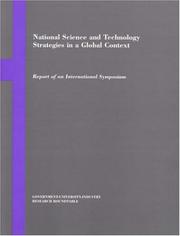| Listing 1 - 10 of 28 | << page >> |
Sort by
|
Book
ISBN: 9029041889 Year: 1993 Publisher: Amsterdam Meulenhoff
Abstract | Keywords | Export | Availability | Bookmark
 Loading...
Loading...Choose an application
- Reference Manager
- EndNote
- RefWorks (Direct export to RefWorks)
#gsdbf --- Science and industry --- Science --- Scientists --- Professional employees --- Natural science --- Science of science --- Sciences --- Industry and science --- Industries --- Natural sciences
Book
ISBN: 1351277561 0367107821 1907643516 1906093806 9781907643514 9781906093808 9781351277563 1351277545 Year: 2012 Publisher: Sheffield England Greenleaf Pub.
Abstract | Keywords | Export | Availability | Bookmark
 Loading...
Loading...Choose an application
- Reference Manager
- EndNote
- RefWorks (Direct export to RefWorks)
"This groundbreaking new book by business scholar William C. Frederick presents an innovative, exciting - even revolutionary - view of corporate management and the challenges it confronts in today's world. The author proposes a management paradigm shift transforming the way corporations do business. Management scholarship and research may well be rechanneled from current orientations to new models, concepts, and theories of what it takes to manage corporations in a planetary world confronting climate change, energy crises, and securing the well-being of all global citizens. Natural Corporate Management (NCM) is an awareness and an acceptance by the managers of today's business corporations of the close functional linkage between natural forces and human economic choices. NCM is not a set of techniques or methods but is a growing consciousness by managers of the presence and influence of nature in all managerial decisions. The book's central theme is that business and nature are locked into an evolutionary partnership that defines all aspects of corporate management, including decisions, policy, goal-seeking, organizational design, workplace behavior, and productive operations. This partnership of Nature and Nurture yields economic, social, and ecological dividends for corporations, their stakeholders, and the global community. An "Evolutionary Cascade" depicts the various phases of evolutionary change - physical, organic, genetic, human, neurological, symbolic - beginning with the Big Bang origin of the Universe and continuing to modern times. These evolutionary events collectively influence the operational activities of all business firms. A "Natural Theory of the Firm" summarizes the NCM approach, as well as the mind-set of corporate managers, and the bio-socio-economic consequences of their decisions. This theoretically-innovative book proposes an agenda of corporate actions to promote long-term sustainability and economic well-being of business, its stakeholders, and planetary citizens everywhere. It will be essential reading for managers and researchers at all levels who wish to engage seriously with the challenges of organic life and its long-term sustainability."--Provided by publisher.
Management. --- Management --- Science and industry. --- Philosophy. --- Industry and science --- Administration --- Industries --- Industrial relations --- Organization --- Science and industry --- Philosophy --- E-books

ISBN: 0309061326 9786610210442 1280210443 0309591988 0585293597 9780585293592 0309173906 Year: 1998 Publisher: Washington, D.C. National Academy Press
Abstract | Keywords | Export | Availability | Bookmark
 Loading...
Loading...Choose an application
- Reference Manager
- EndNote
- RefWorks (Direct export to RefWorks)
POLITICAL SCIENCE --- Public Policy / General --- Science and state --- Technology and state --- Science and industry --- Science --- Technology --- International cooperation --- Industry and science --- Industries

ISBN: 0801886937 0801893305 9780801893308 9780801886935 Year: 2008 Publisher: Baltimore Johns Hopkins University Press
Abstract | Keywords | Export | Availability | Bookmark
 Loading...
Loading...Choose an application
- Reference Manager
- EndNote
- RefWorks (Direct export to RefWorks)
Six historical case studies--two from Britain, one each from France and Germany, and two from the United States--illustrate the concept's fascinating development and provide context for the meanings of, and uses for, efficiency today and in the future.
Technological innovations --- Industrial efficiency. --- Science and industry. --- Industrial efficiency --- Science and industry --- Business & Economics --- Economic History --- History. --- History --- Industry and science --- Efficiency, Industrial --- Industries --- Industrial management --- E-books

ISBN: 0262083590 9786612098437 0262275325 1282098438 142946562X 9780262275323 9781429465625 9780262083591 9780262582728 0262582724 9781282098435 6612098430 Year: 2007 Publisher: Cambridge, Mass. MIT Press
Abstract | Keywords | Export | Availability | Bookmark
 Loading...
Loading...Choose an application
- Reference Manager
- EndNote
- RefWorks (Direct export to RefWorks)
In Alternative Pathways in Science and Industry, David Hess examines how social movements and other forms of activism affect innovation in science, technology, and industry. Synthesizing and extending work in social studies of science and technology, social movements, and globalization, Hess explores the interaction of grassroots environmental action and mainstream industry and offers a conceptual framework for understanding it. Hess proposes a theory of scientific and technological change that considers the roles that both industry and grassroots consumers play in setting the research agenda in science and technology, and he identifies "alternative pathways" by which social movements can influence scientific and technological innovation. He analyzes four of these pathways: industrial opposition movements, organized against targeted technologies (as in the campaign against nuclear energy); technology- and product-oriented movements, which press for alternatives (as does the organic food movement); localism, which promotes local ownership (as in "buy-local" campaigns); and access pathways, which support a more equitable distribution of resources. Within each pathway, Hess examines reforms in five different areas: agriculture, energy, waste and manufacturing, infrastructure, and finance. The book's theoretical argument and empirical evidence demonstrate the complex pattern of incorporation (of grassroots innovations) and transformation (of alternative ownership structures and the alternative products themselves) that has characterized the relationship of industry and activism. Hess's analysis of alternative pathways to change suggests ways economic organizations could shift to a more just and sustainable course in the twenty-first century.
Science --- Technology --- Science and industry. --- Social aspects. --- Industry and science --- Science and society --- Sociology of science --- Industries --- ENVIRONMENT/Environmental Politics & Policy
Book
ISBN: 0408712996 Year: 1977 Publisher: London : Butterworths,
Abstract | Keywords | Export | Availability | Bookmark
 Loading...
Loading...Choose an application
- Reference Manager
- EndNote
- RefWorks (Direct export to RefWorks)
Science and state --- Technology and state --- Science and industry --- Industry and science --- Industries --- State and technology --- Technology --- Endowment of research --- Science --- Science policy --- State and science --- State, The --- Government policy
Book
ISBN: 3030987639 3030987647 Year: 2022 Publisher: Cham, Switzerland : Springer Nature Switzerland AG,
Abstract | Keywords | Export | Availability | Bookmark
 Loading...
Loading...Choose an application
- Reference Manager
- EndNote
- RefWorks (Direct export to RefWorks)
Science and industry. --- Health services administration. --- Health administration --- Health care administration --- Health care management --- Health sciences administration --- Health services management --- Medical care --- Health planning --- Public health administration --- Industry and science --- Industries --- Administration --- Management

ISBN: 8301048441 Year: 1983 Volume: 675 34 Publisher: Wazszawa Krakow Panstwowe Wydawnictwo Naukowe
Abstract | Keywords | Export | Availability | Bookmark
 Loading...
Loading...Choose an application
- Reference Manager
- EndNote
- RefWorks (Direct export to RefWorks)
Science and industry --- -Industrial productivity --- -Technological innovations --- -Breakthroughs, Technological --- Innovations, Industrial --- Innovations, Technological --- Technical innovations --- Technological breakthroughs --- Technological change --- Creative ability in technology --- Inventions --- Domestication of technology --- Innovation relay centers --- Research, Industrial --- Technology transfer --- Productivity, Industrial --- TFP (Total factor productivity) --- Total factor productivity --- Industrial efficiency --- Production (Economic theory) --- Industry and science --- Industries --- -Science and industry --- Industrial productivity --- Technological innovations
Book
ISBN: 9211124298 Year: 1999
Abstract | Keywords | Export | Availability | Bookmark
 Loading...
Loading...Choose an application
- Reference Manager
- EndNote
- RefWorks (Direct export to RefWorks)
Science and industry --- -Technological innovations --- -Breakthroughs, Technological --- Innovations, Industrial --- Innovations, Technological --- Technical innovations --- Technological breakthroughs --- Technological change --- Creative ability in technology --- Inventions --- Domestication of technology --- Innovation relay centers --- Research, Industrial --- Technology transfer --- Industry and science --- Industries --- Government policy --- -Government policy --- -Science and industry --- Technological innovations --- Breakthroughs, Technological

ISBN: 1280033649 9786610033645 9264175105 9264197419 Year: 2002 Publisher: Paris Organization for Economic Cooperation and Development
Abstract | Keywords | Export | Availability | Bookmark
 Loading...
Loading...Choose an application
- Reference Manager
- EndNote
- RefWorks (Direct export to RefWorks)
Stronger interactions between science and industry underpin growth in a knowledge economy. A comparison of the intensity and quality of industry-science relationships (ISR) in OECD countries shows that many countries are lagging behind in mobilising science for innovation. The report benchmarks OECD countries’ ISR, identifies relevant good practices in managing the interface between public research and the business sector, and provides a framework for monitoring and assessing evolving policies in the area. The report presents an in-depth comparative study of ISR in France and the United Kingdom and a special chapter on Japan.
Benchmarking (Management). --- Research, Industrial. --- Science and industry. --- Research, Industrial --- Science and industry --- Benchmarking (Management) --- Engineering & Applied Sciences --- Technology - General --- Benchmarks (Management) --- Industry and science --- Contract research --- Industrial research --- Total quality management --- Industries --- Research --- Engineering experiment stations --- Inventions --- Technological innovations --- Sciences et industrie --- Recherche industrielle
| Listing 1 - 10 of 28 | << page >> |
Sort by
|

 Search
Search Feedback
Feedback About UniCat
About UniCat  Help
Help News
News